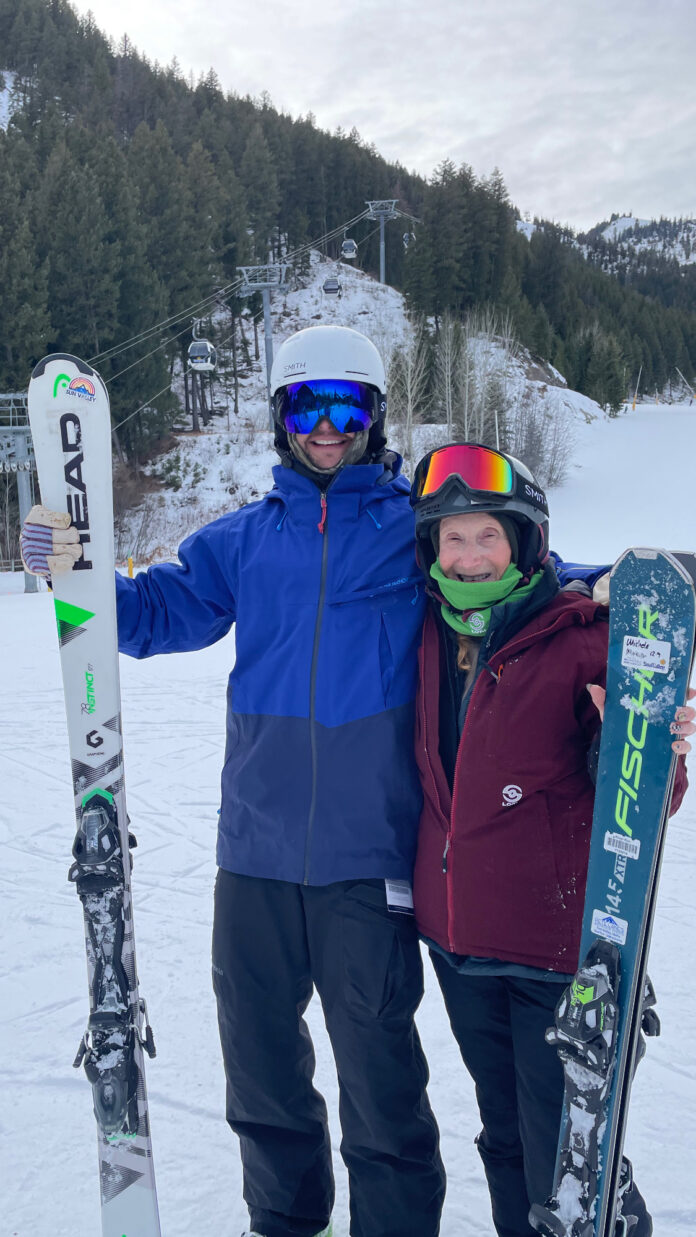BY ISAIAH FRIZZELL
For more than 25 years, the Sun Valley non-profit Higher Ground has helped people of all abilities deal with trauma and social rehabilitation. “With recreation, therapy, and continued support, we bridge the gap between disability and belonging.”
Known as a premier therapeutic support service across the country, Higher Ground has raised the bar for adaptive recreation and psychological support. Offering innovative therapeutic recreation, adaptive sports as well as Veterans and First-Responders Programs, it helps individuals with disabilities reintegrate their body and minds largely using the rigors and challenges of outdoor activity. From scuba, mountain biking, mountaineering, climbing, skiing, surfing, and cycling, their programs run the gamut of what therapy can look like, done in the wild.
Veterans Snow Sports
A week ago, HG wrapped its first Veteran’s Snow Sports program of the year with eight veterans and 16 volunteers they’re just getting started on helping veterans win the winter this season.
Certified Therapeutic Recreation Specialist Kristian King is the program manager for the Veterans and First Responders program. He has a master’s in clinical psychology and has worked with HG for eight years. King is passionate, about its ground-breaking work.
“I think what’s great about recreational therapy is that it’s giving people immediate feedback to be able to gain resiliency, adaptability, and flexibility through recreation and leisure,” he said. “So people are able to kind of widen that window of tolerance, if you will.”
Baby Steps
“It’s like they stepped out of their houses to come to our program, right?” King said. “So that’s a step in itself. And then they actually show up to a novel environment where they don’t know anyone. HG sets a really great tone through our volunteers, our donors, our staff to set that safe environment and container for them to almost kind of fall forward.“
“As a veteran or a first responder, they’re coming from a field or an operation where there’s not much room for error,” he continued. “So now they realize, oh, those skills served me once, right, being aware, being cognizant. But now they’re in a space where it’s like, oh, I can make mistakes but this is also serving me. I can fall on my ski run and get back up. It’s kind of like that saying, “It’s not how you fall, it’s how you get back up.”
Trauma recovery is a beautiful and beguilingly simplistic endeavor. The rigors of service often instill a type of discipline that borders on trauma and HG helps these veterans massage that discipline into physical and psychological socialization through this unique interaction with accompanied outdoor activity.
“In this most recent program pretty much every single participant was in some form of post-traumatic growth. We had one, she was in the Navy in a top position as an officer and had just got out two years ago. Then we had someone who had gotten out a decade ago, but was a new amputee. It’s like everyone is at a different page in their journey, but I think the camaraderie and unity within having similar backgrounds really set the tone for them to be able to feel supported and in a space where they can actually be vulnerable. That’s another thing: vulnerability within service, like there’s no space or time for that, right? So this gave them space to be able to take their masks off, and it’s like ‘I’m okay, I’m doing fine, I can push through the pain’ and they realize their problems and issues are valid and they’re able to learn from each other.”
Word of Mouth
HG runs 24 programs a year across the nation and works with Veterans Affairs to serve veterans through its own grant funding. King leads about eight programs a year, ranging from the Palo Alto cycling program to a SoCal surfing program, ocean sports, scuba and skiing. With three full-time staff members including King, Alaina Wilson, and HG alum Adam Shick their volunteer staff numbers are at 20. A small crew doing brilliant work.
So how can you attend or refer a friend?
There are four qualifiers for attending: physical injuries or Polytrauma, Traumatic Brain Injury, Post-Traumatic Stress Disorder, and Military Sexual Trauma (MST).
MST is an often misunderstood and shunned condition where both men and women experience sexual assault in the military and often from their superiors.
“It happens across the spectrum,” King said. “But with men it’s just way less reported, unfortunately. I would say we get at least two, maybe three participants on every program that have experienced it and you see the same stigma with suicide. People are afraid that if you bring up suicide, you’re going to put it in the forefront of people’s minds, and then it’s going to manifest itself. The research has shown the exact opposite. The more you educate about it, the less prevalent it is.”
HG has a righteous authenticity due to 25 years of therapeutic experience across the country. It works in every season of the year. Relying largely on word of mouth, it has helped more than 1,000 participants while growing to a 28-week-long program year largely through word of mouth alone.
If you know someone who might benefit, check out HG’s message, speak to a representative and take the first step in bringing someone out of the darkness and into the light.



